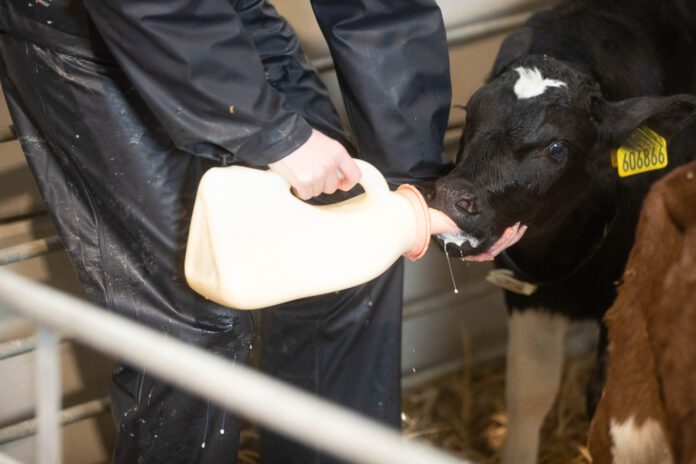Here’s how and when to supplement calves with colostrum to ensure a good start to life
Industry research has found 61 percent of dairy calves and 20 percent of suckler calves left to suckle the dam for colostrum did not receive enough IgG antibodies for successful passive transfer.
This data outlines opportunities both dairy and beef farmers can take to improve the short and long-term health and performance of their herds, says Emily Hall, livestock farmer and product manager for Nettex.
“Passive transfer of disease-fighting antibodies from the dam is reliant on feeding enough high quality of maternal colostrum as quickly as possible after birth,” says Ms Hall. “Simple management measures can be taken to ensure more passive transfer success rates to give calves a stronger start to life.”
For successful passive transfer of IgG antibodies, colostrum quality needs to be a minimum of 50g/l IgG, which equates to 22 Brix when measured with a refractometer.
In new guidelines, it is now recommended calves receive a minimum of 3 litres within the first two hours of life and additional 3 to 4 litres within six to 12 hours of birth – for a total of 6 to 7 litres of high quality colostrum within its first 12 hours of life.
“To be delivered to the blood supply, IgG molecules are absorbed by the small intestine, and rapidly decline after 12 hours of life. This makes timing critical to maternal colostrum absorption,” adds Ms Hall.
Improved management options
To meet the recommended benchmarks for passive transfer, Ms Hall recommends producers stop relying on calves to suckle unsupervised and to test colostrum quality with a refractometer.
“Studies have found 20-25 percent of calves don’t feed from the dam within the first 8 hours of life and few consume enough colostrum within the peak absorption window,” says Ms Hall. “Feeding colostrum via a bottle is preferable since the sucking reflex allows milk to go straight into the abomasum for fast absorption by the small intestine. While tubing is preferable to leaving the calf to suckle the dam, it will delay absorption by 2 to 4 hours due to being delivered into the rumen.”
When colostrum quality is below the recommended 22 Brix or below the minimum 6 litres, supplementation is required to boost antibody availability and energy supply to the calf.
Supplementing colostrum
To capture the benefit of passive immunity from on-farm pathogens, Ms Hall recommends maternal dam colostrum from a cow on the same farm as the best option.
When it is not available or is going to take too long to thaw out for the first feed, she recommends supplementing with a full fat colostrum powder sourced from UK herds like Nettex’s Calf Colostrum Double Strength.
“Calf Colostrum Double Strength can support calf performance when calves are not receiving sufficient good quality maternal colostrum. It also contains growth factors, hormones, vitamins and minerals,” she explains.
Collected from Scottish farms specifically for UK herds, Nettex’s colostrum range is free from TB, Johnes and EBL. It is also of known quality and has been tested for safety and efficacy – giving producers a quick and convenient colostrum supplement that will support the health of calves.
“Whether calves can get all of their colostrum from the dam or if you are needing to supplement, it is essential for the short and long-term health of the calf to ensure it is receiving adequate amounts of the right quality, at the right time” concludes Ms Hall. “Calf Colostrum Double Strength is a great option to deliver high quality bovine colostrum to calves in a short amount of time.”

| [donate]
| Help keep news FREE for our readersSupporting your local community newspaper/online news outlet is crucial now more than ever. If you believe in independent journalism,then consider making a valuable contribution by making a one-time or monthly donation. We operate in rural areas where providing unbiased news can be challenging. |



















